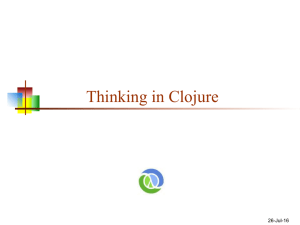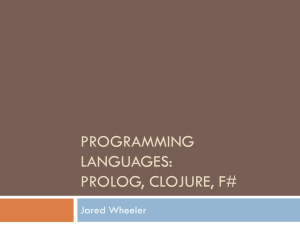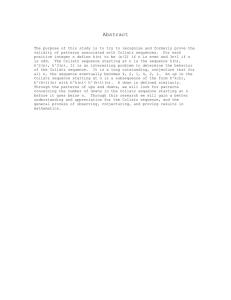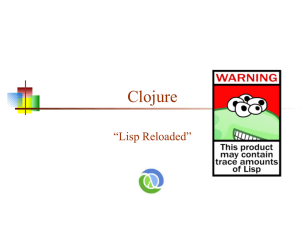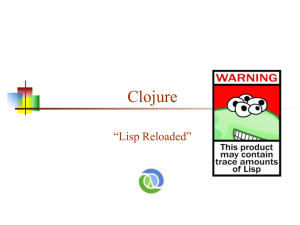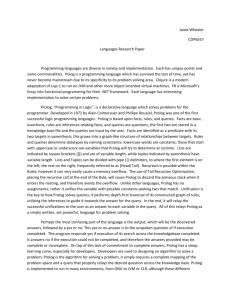Thinking in Clojure 26-Jul-16
advertisement
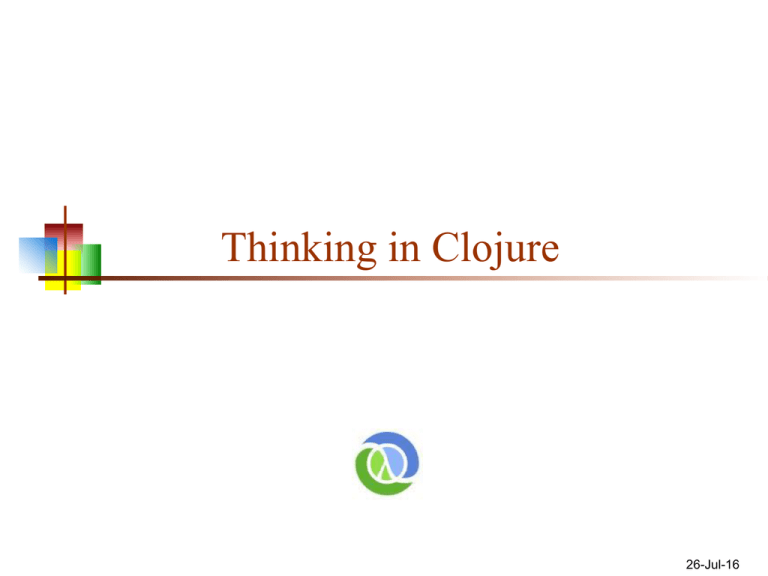
Thinking in Clojure
26-Jul-16
Jumping in
We’ll quickly go through Clojure’s data types, some
basic functions, and basic syntax
Then we’ll get to the good stuff!
2
Clojure’s data types
Clojure has:
Lists, enclosed in parentheses and separated by spaces or commas:
(a 17 "Plenty of parentheses")
Functions: (fn [x] (first(rest x))
Numbers: All Java numeric types, plus ratios and exact decimals:
5, 5.3, 5.3e30, 077, 0xFF00FF, 3/5, 5.3M
Strings, as in Java: "She said \"Hello\""
Characters: \a, \5, \n, \newline, \tab, etc.
The booleans true and false
nil, equivalent to Java’s null
Symbols, which stand for themselves: :meadow, :CIS-554
Vectors: [5 :a "hi!"]
Maps: {:one 1, :two 2}
Sets: #{:prolog :clojure}
3
Some basic Clojure functions
Syntax of a function call: (function args)
Basic operations—sequences (seq) are lists, sets, maps, vectors:
(quote arg) or 'arg, to keep arg from being evaluated
Basic arithmetic
(+ args), (- args), (* args), (/ args) , (< args), etc.
Basic logic
(first seq) is the first element in the sequence (or nil)
(rest seq) is what remains when the first element is removed (or nil)
(cons arg seq) returns a new sequence with arg as its first element
(= args) tests whether its args are equal
(empty? seq), (list? seq), (seq? arg), (nil? arg) are more tests
(and args), (or args), (not arg), (if condition result1 result2)
Defining values
(def name value) defines the name to be the given value
(defn name argv value) is shorthand for (def name argv value),
where argv is a vector
4
Functions and special forms
The arguments to a function are evaluated before the function is called
A special form looks just like a function, but it gets its arguments
unevaluated
Example: (* 2 (+ 3 4))
The function * is called with the arguments 2 and 7
The special form itself decides when and whether to evaluate its arguments
quote does not evaluate its argument
if evaluates its first argument, then decides which of the second and third
arguments to evaluate
Clojure allows you to define your own special forms
This means you can define your own control structures
5
A typical Clojure function
(defn first-double-letter
"Returns the first doubled letter in a string, or nil."
[s]
(if (< (count s) 2)
nil
(if (= (first s) (second s))
(first s)
(first-double-letter (rest s)) ) ) )
user=> (first-double-letter "Pennsylvania")
\n
user=> (first-double-letter '(1 2 3 4 3 5 5 4 6))
5
6
It’s easier with cond
cond is an if … then … else if … then … else … construct:
(cond test1 result1 test2 result2 … testN resultN)
It requires an even number of parameters (one result for each test)
The symbol :else may be used as the last test
(defn first-double-letter
"Returns the first doubled letter in a string, or nil."
[s]
(cond (< (count s) 2)
nil
(= (first s) (second s)) (first s)
:else (first-double-letter (rest s)) ) )
user=> (first-double-letter "Pennsylvania")
\n
user=> (first-double-letter '(1 2 3 4 3 5 5 4 6))
5
7
It’s all about recursion
Some rules of doing recursion:
1.
2.
3.
4.
Handle the base cases directly (without recursion)
Recur only with a simpler case
Don’t use global variables
Don’t “look down” into the recursion—that will just confuse you
In Clojure you are almost always working with a list or some similar sequence
Lisp programmers say, “Do something with the head, and recur with the tail”
Clojure doesn’t have global variables
Clojure’s terms for “head” and “tail” are “first” and “rest”
This pretty much covers rules 1 and 2 above
This covers rule #3 above
Rule 4 always holds. Think about what you are doing now, not what some
recursive call is doing
8
Functional programming
Clojure is functional—what does that mean?
Functions are like functions in math—called with the same arguments,
they always return the same result
Functions are values, or first-class objects
This means: No “global variables,” no dependence on external values, and no
side effects!
Functions can be passed as parameters to functions, returned as the value of
functions, created as needed, stored in data structures, and there are
operations on functions that produce new functions
The “blub paradox” applies—the value added is substantial, but not obvious
to an imperative or object-oriented programmer
Data is immutable (like strings in Java)
Clojure’s data structures are designed to make this efficient
Immutable data greatly simplifies concurrent programming
Because data is immutable, loops are unnecessary (use recursion instead!)
9
Costs and benefits
Costs of functional programming
It’s weird and unfamiliar
How can you do anything without objects, mutable variables, or loops?
As a manager, functional programmers are hard to find (and expensive!)
Clojure, and Lisp dialects generally, have too many parentheses!
Benefits of functional programs
Easier to write correct programs
(Loops are used primarily to change the values of things)
“Yeah, right!” – “No, really! All data is local and immutable.”
Easier to write unit tests, because function values depend only on inputs
Much easier to write concurrent programs
Operations on collections make code simpler and more concise
The simpler foundation means less syntax and fewer special cases
Some operations, such as equality testing, are really fast
But it’s still weird!
10
Easier to write correct programs
Programs are easier to write when all data is local
Unit testing is easier, because there are no dependencies on functions that
may or may not have been called previously
When relevant values can be changed elsewhere in the program—possibly in
many places—it’s harder to see all the connections
Functions in a functional language get all relevant input from the parameter list
There is no need for a setUp method
Functional programming supports powerful operations on sequences
The imperative and object-oriented programming styles have been characterized
as “word by word” programming
Some sequence operations, such as membership testing, are provided for you
In a functional language, any function can be a sequence operation
11
The problem of state
Nonfunctional programming language are “stateful” or “have state”
The state of a program is given by (1) the values of all the variables throughout the
program, and (2) the current locus of execution
That can be a huge amount of information to keep track of!
Object-oriented programmers try to control complexity by having objects be
responsible for their own state, and “loosely coupled” (not very dependent on)
other objects
Methods often have “side effects,” that is, they modify state
Functional languages try to avoid having state at all
This isn’t always easy
Purely functional languages cannot have side effects
Since I/O is a side effect, this is an even more difficult restriction
12
Maintaining state, functionally
Sometimes you just need state
Consider an adventure game
You need to keep track of where you are, where other objects are, what you are
holding, which paths are blocked or open, etc.—this is your state
You do not need to keep track of permanent, immutable data; for example, most paths
between rooms are fixed and unchanging—this isn’t part of the state
In a functional program, a “state” is just an immutable (and usually just one)
data item
The data item can be quite complex, such as a dictionary
States are immutable, but you can always create a “new” state that is a variation
of a given state
With carefully designed data structures, not as much storage is required as you might
expect
So the functional solution to maintaining state is: Pass one state into a function,
get a new (and different) state back!
13
Clojure’s I/O compromise
A purely functional program has no side effects
In Clojure, all functions return a value
(print args) and (println args) return nil
Clojure allows side effects in two well-defined places:
I/O is a side effect
Therefore: A purely functional program cannot do I/O!
(do args) evaluates all its arguments in order, but returns only the value of the last one
When a function (fn argv args) is called, the arguments are evaluated in order, but only
the last value is returned
Example:
(defn powers "Computes cube and square" []
(def n (read))
(println (* n n n))
(println (* n n))
n)
14
Lists are immutable
Here is a typical list:
my-list
A
B
C
w
Here is
(cons 'w my-list)
Here is (rest my-list)
Notice that my-list remains unchanged
Vectors, hash maps, sorted maps, hash sets, and sorted sets
are similarly immutable
15
Functions are just values
user=> (cons 'w '(a b c))
(w a b c)
user=> (defn swap-args [f x y] (f y x))
#'user/swap-args
user=> (swap-args cons '(a b c) 'w)
(w a b c)
user=> (defn apply-n-times [f x n]
"Apply f to x, n times: f(f(f..(n)...))"
(if (zero? n)
x
(apply-n-times f (f x) (dec n)) ) )
#'user/apply-n-times
user=> (apply-n-times (fn [x] (* 2 x)) 1 10)
1024
16
Collatz, the hard way
Definition:
collatz(1) = 1
collatz(n) = collatz(n / 2) if n is even
collatz(n) = collatz(3 * n + 1)
user=> (defn collatz [n]
(let [ do-even (fn [n] (collatz (/ n 2)))
do-odd
(fn [n] (collatz (inc (* 3 n)))) ]
(print n " ")
(if (= n 1) 1
(if (even? n) (do-even n) (do-odd n)) ) ) )
#'user/collatz
user=> (collatz 7)
7 22 11 34 17 52
26
13
40
20
10
5
16
8
4
2
1
1
17
map, filter, and reduce
Here are three powerful functions you will find in almost any
functional programming language
map – apply a function to every element of a sequence, returning a
sequence of results
filter – apply a predicate to every element of a sequence, returning a
sequence of those that satisfy the predicate
user=> (map even? '(3 1 4 1 6))
(false false true false true)
user=> (filter even? '(3 1 4 1 6))
(4 6)
reduce – use a function to reduce a sequence to a single value
user=> (reduce * '(3 1 4 1 6))
72
18
The real problem with state
For decades we’ve been dealing with mutable state
Mutable state + concurrency = nondeterminism
We use threads and locks and semaphores and so on
As Herb Sutter points out in The Free Lunch is Over, we have hit a 3 GHz barrier
Since 2003, computers have not gotten faster
We still want them faster
Concurrency is the only solution
Functional languages, with immutable state, provide a partial solution
As Martin Odersky points out, you can hide from concurrency for a while yet…but
not forever
Important consequences:
These are complicated, unsafe, and inefficient
All newer languages are gaining functional and concurrent features
Older languages, such as Java, are also trying to integrate these features
“You can run, but you can’t hide!”
19
Oh, and by the way…
Clojure has
Infinite sequences
Lazy sequences
Exact decimal arithmetic
Function composition
Function currying
Macros
And lots more
No version of Lisp has ever become mainstream
They just get mugged in dark alleys and their ideas stolen!
20
The End
21
